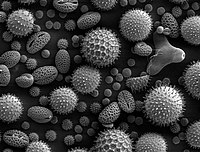Clinical study supports pollen tablets as hay fever treatment
Friday, September 1, 2006

A large clinical trial found that grass pollen tablets under the tongue (sublingual) are an effective treatment option for hay fever sufferers. The results have been published in this month's edition of the Journal of Allergy and Clinical Immunology.
Tablets with grass pollen that dissolve quickly under the tongue may provide doctors with a better tool to fight the illness. The patient could take the pills at his own home, and after a while the symptoms may disappear completely and treatment can be ceased. Contrary to the current standard treatment, this therapy targets the immune system in such a way that it treats the cause and not just the symptoms.
634 patients from 8 countries participated in the trial. Half received Grazax® tablets (a product of ALK-Abello, Hørsholm, Denmark), the other half placebo pills. The group receiving treatment showed fewer symptoms during hay fever season and consequently cut down on their medication use. Grazax® also caused few and tolerable side effects such as itching and swelling in the mouth.
Combined with several earlier papers, these results provide a basis for ALK-Abello to apply for European approval of their drug. It has already been approved in Sweden, and the company will follow a Mutual Recognition Procedure hoping to get their product in European pharmacies by the end of 2006. The company will continue to fund further inquiries into Grazax® and will keep collaborating with scientists from several European countries.
During hay fever season, patients develop a runny nose, swelling of the mucous membranes of the nose, sneezing and teary eyes, a condition doctors call allergic rhinoconjunctivitis. The condition seems to be increasingly frequent, with approximately 10% of the population suffering from grass pollen allergy. First-line treatment includes antihistaminics (like cetirizine or Zyrtec®/Zyrlex®) and steroid sprays, but results are often disappointing.
Long term results have been demonstrated for weekly shots with pollen extracts (a procedure called desensitization), but too many visits to the doctor make the process troublesome. Also, the patient has to wait some time before leaving the doctor's office, due to the risk of developing a kind of shock state termed anaphylactic shock.
Sources
- "Pill could replace allergy shots for hay fever" — Reuters, August 30, 2006
- Dahl R, Kapp A, Colombo G, de Monchy JG, Rak S, Emminger W, Rivas MF, Ribel M, Durham SR. Efficacy and safety of sublingual immunotherapy with grass allergen tablets for seasonal allergic rhinoconjunctivitis. Journal of Allergy and Clinical Immunology, 2006; 118: 434-40. PubMed
- Durham SR, Yang WH, Pedersen MR, Johansen N, Rak S. Sublingual immunotherapy with once-daily grass allergen tablets: a randomized controlled trial in seasonal allergic rhinoconjunctivitis. Journal of Allergy and Clinical Immunology, 2006; 117(4): 802-9. PubMed
- "A definitive Phase 3 Trial of Grazax Confirms Clinical Benefit for Hay Fever Sufferers" — Doctor's Guide, March 10, 2005
- Press Release: "High hopes for GRAZAX®" — ALK-Abelló, annual report 2004/2005
| |
This page has been automatically archived by a robot, and is no longer publicly editable.
Got a correction? Add the template {{editprotected}} to the talk page along with your corrections, and it will be brought to the attention of the administrators. Please note that the listed sources may no longer be available online. |

